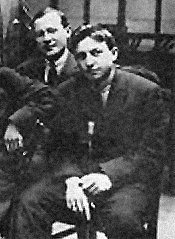Weniamin Alexandrowitsch Kawerin
Veniamin Kaverin ( Russian Вениамин Александрович Каверин , actually silver * 6 (Зильбер) jul. / 19th April 1902 greg. In Pskov , † 4. May 1989 in Moscow ) was a Soviet writer . Among other things, he wrote the novel Before the Mirror (1971). He was a co-founder of the literary group Serapionsbrüder .
life and work
Kawerin was the son of a conductor in Pskow and began writing poetry as a high school student. At the age of 16 he came to Moscow, where he finished high school and began studying. In 1920 he moved to Petrograd and studied at the local university and the Institute for Eastern Languages at the Department of Arabic Languages. After graduating in 1923/24 he continued to work as an aspirant at the university and in 1929 submitted his dissertation under the title Baron Brambeus, the story of Ossip Senkowski ( Барон Брамбеус. История Осипа Сенковского ), a work on a Russian journalist.
Parallel to studying and working at the university, Kawerin wrote poems and stories and founded the "Serapion Brothers" together with Mikhail Soschtschenko , Nikolai Tichonow and Vsevolod Ivanov . In an almanac of the group he published the story Chronik der Stadt Leipzig in 1922 ( Хроника города Лейпцига за 18… год ). He had previously been awarded a prize for the story The Eleventh Axiom ( Одиннадцатая аксиома ).
Kawerin's first stories can be attributed to fantastic literature and are under the influence of ETA Hoffmann and Edgar Allan Poe . In 1929 his first novel was published, Der Trohestifter ( Скандалист, или Вечера на Васильевском острове ). From 1934 to 1936 Kawerin worked on the two-part novel The Fulfillment of Wishes ( Исполнение желаний ). Kawerin achieved particular popularity in 1938 as an author of books for young people through the multi-part novel Two Captains ( Два капитана , model of the musical Nord-Ost ) , published in 1938–1944 . In 1946 he received the Stalin Prize for Two Captains .
During the Great Patriotic War , Kawerin was a war correspondent for the Izvestia newspaper and continued to write short stories and poems.
A trilogy of novels about the Russian microbiologist Tatiana Vlaenkova formed the focus of Kawerin's work after the war. Between 1949 and 1956, the three volumes of The Open Book ( Открытая книга ) were published.
In 1991 the asteroid (2458) Veniakaverine was named after him.
Works in German
- Two captains - novel in two volumes. - SWA-Verlag , 1947
- The open book - Luchterhand, 1977. ISBN 3-472-86420-6
- The end of a gang. Narrative. - Suhrkamp Verlag, 1986. ISBN 978-3518374924
- Berlocche. A fairy tale novel. - Kiepenheuer Verlag, 1990. ISBN 978-3378003590
- In front of the mirror . Suhrkamp Verlag, 1998. ISBN 978-3518222980
- Renunciation and fulfillment, novel. Military publishing house, Berlin 1988.
- The double portrait. Insel Verlag, 1998. ISBN 978-3458155942
- Unknown master. Suhrkamp Verlag, Frankfurt / Main 1961.
- The fulfillment of wishes, Roman. Insel Verlag, Frankfurt a. Main 1976.
Web links
- Literature by and about Weniamin Alexandrowitsch Kawerin in the catalog of the German National Library
- Veniamin Kaverin in the Internet Movie Database (English)
Individual evidence
| personal data | |
|---|---|
| SURNAME | Kawerin, Weniamin Alexandrovich |
| ALTERNATIVE NAMES | Вениамин Александрович Каверин; Silver (real name); Зильбер (real name) |
| BRIEF DESCRIPTION | Soviet writer, author of books for young people |
| DATE OF BIRTH | April 19, 1902 |
| PLACE OF BIRTH | Pskov |
| DATE OF DEATH | May 4th 1989 |
| Place of death | Moscow |
